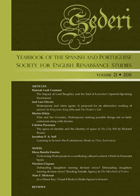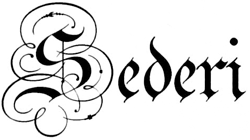
Sederi 21
Sederi 21 — 2011
EDITORS
Berta Cano Echevarría & Ana Sáez-Hidalgo
REVIEW EDITOR
Francisco J. Borge López
ISSN 1135-7789
Jonathan P. A. Sell, “Learning to Scrawl: The Evolutionary Strain in Titus Andronicus.” SEDERI 21 (2011): 91-116.
DOI: https://doi.org/10.34136/sederi.2011.5 Download PDF
Abstract
Much has been written on the semiotic obsessions of Shakespeare’s Titus Andronicus, less on their relationship with matters of theme. This paper argues first that the play’s engagement with the mutual relationships between language, labour and society draws on classical and early modern accounts of the symbiotic evolution of language and civilised society. It then suggests that the play’s particular rhetorical and kinesiological focus on hand and tongue anticipates the metonymies deployed in Darwinian accounts of human evolution. Key to this reading is the well-known scrawl/scrowl crux: far from opting for a definitive, exclusive meaning, the paper proposes that the semantic uncertainty unleashed at the crux mimics the play’s representation of Rome’s and, in the last resort, humanity’s hesitation between literate civilization and creeping barbarism. No longer a merely lexical quibble over the competing, variously obsolescent and emergent, notions of crawling, gesticulating and scribbling, the crux becomes the touchstone of an evolutionary reading of the play. Just as scrawl/scrowl debates endlessly between different stages on the human evolutionary scale, so Titus Andronicus leaves its readers and audience in uneasy contemplation of Rome’s – and their own – perpetual teetering on the brink of degradation.
Keywords: Titus Andronicus; evolution; civilization; barbarism; language.
References
Bate, Jonathan 1995. “Introduction” Titus Andronicus. Arden Third Series. London: Routledge. 1-121.
Bate, Jonathan 1996-1997. “’Lucius, the Severely Flawed Redeemer’: A Reply.” Connotations 6/3: 330-333.
Beer, Gillian 1983. Darwin’s Plots. Evolutionary Narrative in Darwin, George Eliot and Nineteenth-Century Fiction. London: Ark Paperbacks.
Benjamin, Walter 2005. “On the Concept of History.” Trans. Dennis Redmond. <url: http://www.marxists.org/reference/archive/benjamin/1940. html>. Last accessed 08/03/2011.
Chapple, J. A. V. 1986. Science and Literature in the Nineteenth Century. Basingstoke and London: Macmillan.
Chatwin, Bruce 1988. The Songlines. London: Pan.
Cicero 1926. De oratore. Trans. E. W. Sutton and H. Rackham. 2 vols. Cambridge, MA: Harvard University Press; London: William Heineman.
Cicero 1948. De invention. Trans. H. M. Hubbell. Cambridge MA: Harvard University Press.
Danson, Lawrence 1974. Tragic Alphabet: Shakespeare’s Drama of Language. New Haven: Yale University Press.
Darwin, Charles 2004. The Descent of Man. London: Penguin.
Engels, Frederick Engels 1975. “The Dialectics of Evolution.” In Frederick Engels, The Part Played by Labour in the Transition from Ape to Man. Peking: Foreign Languages Press.
Fawcett, Mary Laughlin 1983. “Arms/words/tears: language and the body in Titus Andronicus.” English Literary History 50: 261-277.
Gera, Deborah Levine 2003. Ancient Greek Ideas on Speech, Language and Civilization. Oxford: Oxford University Press.
Horace 1928. Satires, Epistles and Ars Poetica. Trans. H. Rushton Fairclough. Cambridge, MA: Harvard University Press; London: William Heineman.
Hulse, Clarke 1979. “Wresting the Alphabet: Oratory and Action in Titus Andronicus.” Criticism 21: 106-118.
Hunt, Maurice 1997-1998. “Exonerating Lucius in Titus Andronicus: A Response to Anthony Brian Taylor.” Connotations 7/1: 87-93.
Jagendorf, Zvi 1990. “Coriolanus: Body Politic and Private Parts.” Shakespeare Quarterly 41/4: 455-469.
James, Heather 1991. “Cultural disintegration in Titus Andronicus: mutilating Titus, Vergil and Rome.” Ed. James Redmond. Violence in Drama, Themes in Drama, 13. Cambridge: Cambridge University Press. 123-140.
Kaiser, Ulrich 2006. “Staging Violence and Terror: Violated Bodies, Truth and Language in Titus Andronicus.” Deutsche Shakespeare-Gesellschaft 4. <url: http://www.shakespeare-gesellschaft.de/publikationen/seminar/ ausgabe2006/ kaiser.html>. Last accessed 17/02/2010.
Kendall, Gillian Murray 1989. “‘Lend me thy hand’: Metaphor and Mayhem in Titus Andronicus.” Shakespeare Quarterly 40/3 (Autumn): 299-316.
Kolin, Philip C. 1997-1998. “‘Lucius, the Severely Flawed Redeemer of Titus Andronicus’: A Reply.” Connotations 7/1: 94-96.
Marti, Markus 2001: “Language of Extremities / Extremities of Language: Body Language and Culture in Titus Andronicus.” Paper delivered at 7th World Shakespeare Congress, Valencia, 18-22 June 2001. <url: http://pages.unibas.ch/shine/revengemarti.htm>. Last accessed 17/02/2010.
Marx, Karl 1976. Capital Volume 1. Trans. Ben Fowkes. London: Penguin.
Maxwell, J. C. ed. 1953. Titus Andronicus. The Arden Shakespeare. (2nd Series). London: Methuen.
Onions, C. T. 1986. A Shakespeare Glossary. Enlarged and revised by Robert D. Eagleson. Oxford: Clarendon Press.
Ortiz, Joseph M. 2005. “’Martyred Signs’: Titus Andronicus and the Production of Musical Sympathy.” Shakespeare 1/1&2: 53-74.
Porter, Roy 2000. Enlightenment: Britain and the Creation of the Modern World. London: Penguin.
Puttenham, George 1999. “English poetics and rhetoric.” [Extracts from The Arte of English Poesie]. Ed. Brian Vickers. English Renaissance Literary Criticism. Oxford: Clarendon Press. 190-296.
Reade, W. Winwood 1948. The Martyrdom of Man. London: Watts.
Rowe, Katherine A. 1994. “Dismembering and Forgetting in Titus Andronicus.” Shakespeare Quarterly 45/3: 279-303.
Sambrook, James 1986. The Eighteenth Century: The Intellectual and Cultural Context of English Literature, 1700-1789. London and New York: Longman.
Schabert, Ina 1997. Englische Literaturgeschichte: Eine neue Darstellung aus der Sicht der Geschlechterforschung. Stuttgart: Kröner.
Sell, Jonathan P. A. 2008. “Vulgar poesy and the music of disorder in The Tempest.” SEDERI 18: 121-145.
Shakespeare, William 1995. Titus Andronicus. The Arden Shakespeare (3rd Series). Ed. Jonathan Bate. London: Routledge.
Taylor, Anthony B. 1996-1997. “Lucius, the Severely Flawed Redeemer of Titus Andronicus.” Connotations 6/2: 138-157.
Tricomi, Albert H. 1974. “The Aesthetics of Mutilation in Titus Andronicus.” Shakespeare Survey 27: 11-19.
Wells, Stanley and Taylor, Gary 1987. William Shakespeare. A Textual Companion. Oxford: Clarendon Press.
Williams, Raymond 2005. “Base and Superstructure in Marxist Cultural Theory.” Culture and Materialism. London: Verso. 31-49.
Wilson, Thomas 1999. “An English Rhetoric (1560).” [Extracts from The Arte of Rhetorique]. Ed. Brian Vickers. English Renaissance Literary Criticism. Oxford: Clarendon Press. 73-124.
